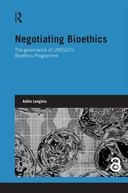Explore

Negotiating Bioethics: The governance of UNESCO’s Bioethics Programme
Adèle Langlois
2013
4 Ungluers have
Faved this Work
Login to Fave
The sequencing of the entire human genome has opened up unprecedented possibilities for healthcare, but also ethical and social dilemmas about how these can be achieved, particularly in developing countries. UNESCO’s Bioethics Programme was established to address such issues in 1993. Since then, it has adopted three declarations on human genetics and bioethics (1997, 2003 and 2005), set up numerous training programmes around the world and debated the need for an international convention on human reproductive cloning.
Negotiating Bioethics presents Langlois’ research on the negotiation and implementation of the three declarations and the human cloning debate, based on fieldwork carried out in Kenya, South Africa, France and the UK, among policy-makers, geneticists, ethicists, civil society representatives and industry professionals. The book examines whether the UNESCO Bioethics Programme is an effective forum for (a) decision-making on bioethics issues and (b) ensuring ethical practice. Considering two different aspects of the UNESCO Bioethics Programme – deliberation and implementation – at international and national levels, Langlois explores:
Negotiating Bioethics presents Langlois’ research on the negotiation and implementation of the three declarations and the human cloning debate, based on fieldwork carried out in Kenya, South Africa, France and the UK, among policy-makers, geneticists, ethicists, civil society representatives and industry professionals. The book examines whether the UNESCO Bioethics Programme is an effective forum for (a) decision-making on bioethics issues and (b) ensuring ethical practice. Considering two different aspects of the UNESCO Bioethics Programme – deliberation and implementation – at international and national levels, Langlois explores:
- how relations between developed and developing countries can be made more equal; who should be involved in global level decision-making and how this should proceed; how overlap between initiatives can be avoided;
- what can be done to improve the implementation of international norms by sovereign states; how far universal norms can be contextualized;
- what impact the efficacy of national level governance has at international level.
This book is included in DOAB.
Why read this book? Have your say.
You must be logged in to comment.
Rights Information
Are you the author or publisher of this work? If so, you can claim it as yours by registering as an Unglue.it rights holder.Downloads
This work has been downloaded 1379 times via unglue.it ebook links.
- 192 - pdf (CC BY-NC-ND) at OAPEN Library.
- 429 - pdf (CC BY-NC-ND) at OAPEN Library.
- 518 - pdf (CC BY-NC-ND) at Internet Archive.
Keywords
- Bio-ethics
- bioethics
- Biology, Life Sciences
- Cloning
- developing country
- Ethics
- Ethics, Medical
- genetic sciences
- Genetics
- Genetics, Medical
- Human cloning
- Indice General de la Bolsa de Valores de Colombia
- International cooperation
- Kenya
- Life sciences: general issues
- Mathematics & science
- Medical
- Program Evaluation
- Science
- Science / Biotechnology
- Social sciences
- Sociology
- South Africa
- thema EDItEUR::P Mathematics and Science::PS Biology, life sciences::PSA Life sciences: general issues::PSAD Bioethics
- Unesco's Bioethics Programm
Links
web: https://www.routledge.com/Negotiating-Bioethics-Open-Access-The-Governance-of-UNESCOs-Bioethics/Langlois/p/book/9780415533461Editions

